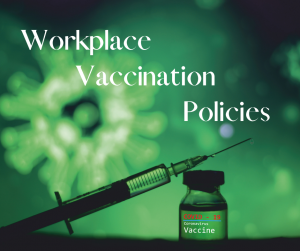As COVID-19 vaccines begin to become available for working-age people—first for those in healthcare, then those in other “frontline” occupations, then for those at risk due to medical conditions, and finally for the general 18-to-64 population—can employers implement mandatory vaccination policies?
In general, the answer is yes, according to the Equal Opportunity Employment Commission, although employers need to be careful on a number of fronts, starting with ensuring that the way they craft their policy does not run afoul of the Americans with Disabilities Act.
While there is nothing inherent in requiring a vaccine that violates ADA principles, employers need to realize that the pre-vaccination medical screening required to make sure a person can be vaccinated safely could bump up against ADA stipulations against asking about disabilities. So if the employer or a third party hired by the employer provides the vaccine, it must be shown that screening questions are “job-related and consistent with business necessity.”
If an employee cannot take the vaccination for disability-related reasons, employers may only bar them from the workplace if they can show there is a “direct threat” and “risk of substantial harm” to that employee or others that the employer cannot reasonably accommodate. The employer should assess the duration of the risk posed as well as the nature, severity, likelihood and imminence of harm. Even if the employer determines that the unvaccinated person represents a risk, they must consider accommodations like working remotely or taking legally allowable leave.
There are similar considerations surrounding any requirement that an employee show proof they have been vaccinated so that the employer can either determine their ability to return to work, provide an incentive to take the vaccine, or reassure customers that want to know whether their vendor’s employees have been vaccinated.
A simple request for proof of receipt of a COVID-19 vaccination does not constitute a disability-related inquiry, but other inquiries might—such as asking why they did not receive one—unless it falls under the “job-related and consistent with business necessity” framework. In fact, employers who ask for written proof might want to caution employees against inadvertently providing any medical information as part of this process.
When providing such information to customers, employers should first ask themselves whether it’s absolutely necessary, whether they should first get consent from employees, how they plan to transmit the information, whether the customer has adequate safeguards in place to protect it, and who would be in charge to ensure that it would remain private.
Although some might be tempted to bypass the issue of asking an employee whether they were vaccinated and instead asking the employer’s healthcare plan for such information, this likely would constitute a violation of HIPAA unless they employee provided authorization.
More generally, obligations in both statutory and common law mandate that employers protect personal information about employees. This extends to physical health, and thus COVID-19 vaccination status. Employers should have their own safeguards around managing access, retaining and later destroying records, and making determinations about whether it needs to be disclosed to a third party.
There are other considerations in drawing up vaccination policies, such as how to handle employees who say a vaccination violates their religious beliefs, or what to do when a union claims that vaccination requirements violate a collective bargaining agreement. Becoming fully informed about and thoroughly discussing these issues can inoculate your company against any and all symptoms of employee conflict related to COVID-19 vaccinations.
 Chicago Business Attorney Blog
Chicago Business Attorney Blog


